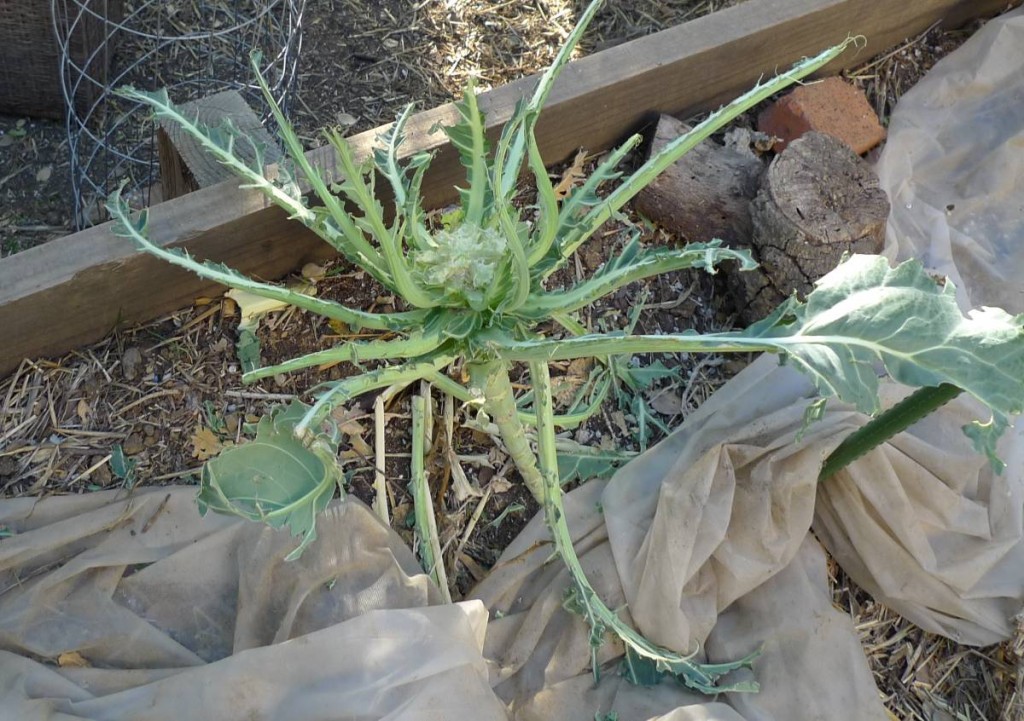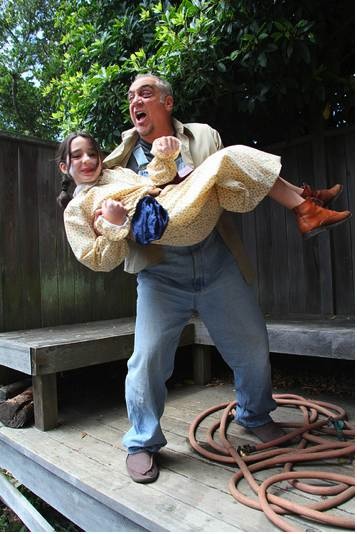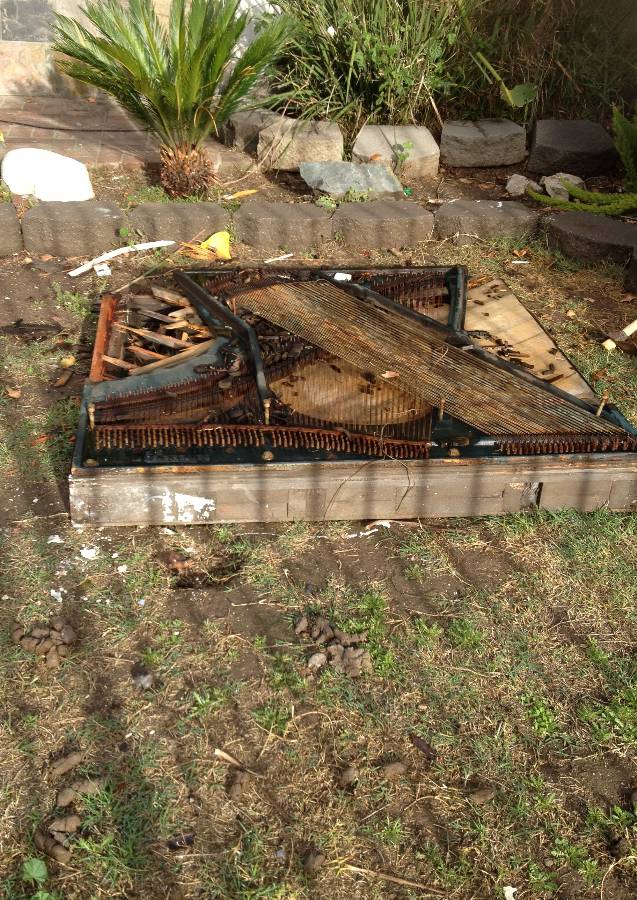I received this poem in my email this morning, and think it’s worth reprinting here. I love how the poet starts off in a folksy way, as if Galileo were a friend, and the poet was simply remembering a conversation. Then the images of blowing paper and terrified squirrel leap and flutter on the page, each with their particular qualities. Continue reading “Appropos of nothing”
Month: January 2012
Sad, jailed piano
Poets and their mothers
I’ve been reading Adam Zagajewski’s recent book of poetry, Unseen Hand, translated by Clare Cavanagh. Zagajewski writes in Polish, and I’ve long admired his work.
I encountered this poem of his just after I had reread a poem of Larry’s about envisioning his mother’s funeral. Yes, Larry, too is a poet. His poem is from his book called Night Train. Here are the two:
I could never say anything about my mother:
how she repeated, you’ll regret it one day,
when I’m not around anymore, and how I didn’t believe
in either “I’m not” or “anymore,”
how I liked watching as she read bestsellers,
always turning to the last chapter first,
how in the kitchen, convinced it wasn’t
her proper place, she made Sunday coffee,
or even worse, filet of cod,
how she studied the mirror while expecting guests,
making the face that best kept her
from seeing herself as she was ( I take
after her in this and other failings),
how she went on at length about things
that weren’t her strong suit and how I stupidly
teased her, for example when she
compared herself to Beethoven going deaf,
and I said, cruelly, but you know he
had talent, and how she forgave it all
and how I remember that, and how I flew from Houston
to her funeral and couldn’t say anything
and still can’t.
Adam Zagajewski, translated by Clare Cavanagh
***************************
 When I go to your funeral
When I go to your funeral
I’ll be clean-shaven & have
a fresh haircut. I’ll wear
a black silk tie with a Windsor
knot, a charcoal-grey suit
(3-buttoned, with vest).
My socks will match.
My shoes will be shined.
I’ll look real sharp, Mom.
And everyone will murmur
“now there’s a young man
with promise” & everything
will be like it once was—
before the pulleys creak
& the ropes slowly lower
your coffin out of the red
clay granite sunshine
of western Oaklahoma.
Larry Rafferty
I think Larry stands up pretty well with Zagajewski, although I have to admit that the lines:
how she studied the mirror while expecting guests,
making the face that best kept her
from seeing herself as she was
are pretty breathtaking in their unsparing appraisal. I’m just glad I wasn’t Mr. Zagajewski’s mother! As for Larry, well, I’m his wife and have often felt that unsparing, appraising eye–but tempered with fondness.
Rain rain beautiful rain
Do you know that song by Ladysmith Black Mambazo? It’s been in my mind these last rainy days after such a long stretch of winter sun. I love looking out and watching storms move over the bay.
Of course, the chickens don’t share my enthusiasm, and huddle in the roofed area around their house.
I wrote this poem almost three years ago, looking out over the bay after a long stretch of rain.
Grammar
When Nietzsche said we no longer need God
because we have grammar, he was talking about
a morning like this one. The rain has finally paused
and patches of intermittent radiance play over the washed world, Continue reading “Rain rain beautiful rain”
Wild and Weegee
Waiting for the late baby, I had time to notice the streets of Venice. It isn’t really surprising that a city that was originally a pleasure park, with canals crafted after the developer had been to Venice, has it’s wacky aspects. The slideshow provides a few:
%%wppa%%
%%album=6%%
I also had time to head over to MOCA, and see a rather disappointing show of Weegee, the pseudonym for Arthur Fellig, a photographer who became famous for his raw, artistic crime photography in NY in the 30’s and 40’s. He came to LA in the 50’s and as the show demonstrates, became rather a caricature of himself, doing lots of trick photography, hobnobbing with the stars, and appearing as a bit player in several films. There were only a few images from this show that I liked–this tricky one of himself (he was a shameless self-promoter): Continue reading “Wild and Weegee”
The peculiar behavior of chickens
I’ve been letting the chickens out into the winter garden to weed and fertilize. I cover or fence off the few crops I don’t want them to eat. But the chickens are curious and persistent. Yesterday, they managed to peel back the ground cover over the last cauliflower and strip it:
This seemed odd to me, because earlier that day, I’d given them some collard leaves, and the chickens just left them on the ground uneaten. Continue reading “The peculiar behavior of chickens”
Olive: the movie
 You may remember that for a week or so last summer, our house was host to a movie crew, and I got to meet one of my favorite actresses. Now the movie, which I wasn’t allowed to talk about then, is out. Gena Rowlands, John Scurti (who you may know from the TV Show “Rescue Me”), and Chris Maher star, along with Ruby Alexander who plays Olive. You can see the first five minutes here. It was frustrating that I didn’t know that its theater debut was at the Nuart in LA over the holidays. My whole family could have gone! Now we’ll have to wait till it appears in “a theater near us.” Some of the scenes in the trailer and in the behind the scenes photos are at my house. This photo shows Chris and Ruby on my back deck, complete with the hose I didn’t coil up.
You may remember that for a week or so last summer, our house was host to a movie crew, and I got to meet one of my favorite actresses. Now the movie, which I wasn’t allowed to talk about then, is out. Gena Rowlands, John Scurti (who you may know from the TV Show “Rescue Me”), and Chris Maher star, along with Ruby Alexander who plays Olive. You can see the first five minutes here. It was frustrating that I didn’t know that its theater debut was at the Nuart in LA over the holidays. My whole family could have gone! Now we’ll have to wait till it appears in “a theater near us.” Some of the scenes in the trailer and in the behind the scenes photos are at my house. This photo shows Chris and Ruby on my back deck, complete with the hose I didn’t coil up.
I hope my scene in the pet store with Gena didn’t wind up on the cutting room floor!
The Late Baby
I spent the last few weeks in LA, mostly waiting for a grandson, who was born just a week ago. More about some LA sights later this week. Suffice it to say that there is plenty of weirdness in the sun-drenched streets of Venice.
In the meantime, Larry reminded me of this wonderful poem by Donald Justice. I’ve mentioned him before in these pages:
To a Ten Months Child Continue reading “The Late Baby”
New Year’s Day Poems
As an act of self-promotion, suicide is hard to beat. Janis Joplin, Jimi Hendrix, most recently Amy Winehouse—their overdose deaths are part of their legend. And would we read Sylvia Plath or Ann Sexton with the same attention without their famous deaths? Of course, suicide is the ultimate desperate act–not a marketing gimmick.
 The survivors have a harder time getting known. Maxine Kumin, a close friend and fellow student with Ann Sexton, has lived a more ordinary life: a long-term marriage, children, a farm in New Hampshire. Her poetry often refers to the cycle of growing things—horses, woodchucks, planting and harvesting, the crusty neighbors who last out the long winters. But it also encompasses the complexity of the modern world and struggles to affirm in full knowledge of its imperfection.
The survivors have a harder time getting known. Maxine Kumin, a close friend and fellow student with Ann Sexton, has lived a more ordinary life: a long-term marriage, children, a farm in New Hampshire. Her poetry often refers to the cycle of growing things—horses, woodchucks, planting and harvesting, the crusty neighbors who last out the long winters. But it also encompasses the complexity of the modern world and struggles to affirm in full knowledge of its imperfection.
I’ve never met Maxine, but years ago I had the temerity to send her a version of her poem “Oblivion,” a poem about those who survive another’s suicide, with an altered ending. Instead of dismissing me as a crank, she wrote me back a gracious note, and we’ve corresponded off and on for several years. You can read or hear another of her poems on surviving her friend’s suicide. Her work, grounded in specifics, moves from these to the larger view the way a camera focuses and then moves back to show the full context.
I want to include three poems of hers in a brief tribute on this first Monday of the New Year. Continue reading “New Year’s Day Poems”

